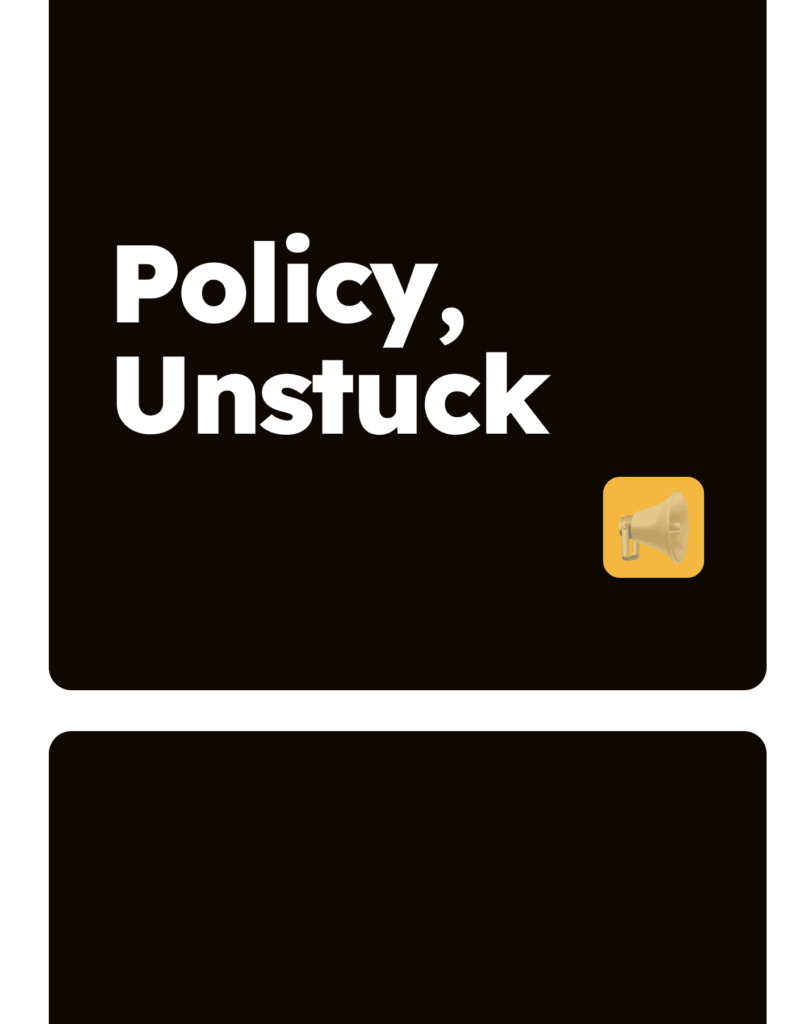This interview with {JACK SELLERS} is part of the {GETTING POLICY UNSTUCK} series. Jack is a former Special Adviser to the Prime Minister, and before that, the Secretary of State for Wales.
#17: Timing, tact, and policy impact – Jack Sellers
Be pragmatic about the political reality. When you’re trying to push something through, you can face real resistance if the policy you’re fighting for significantly alienates one faction within a party. So, in our case, we struggled to push policy through because the Conservative Party was a bit fractured—there was a real sense of disunity and we were at the back end of a bumpy Parliament. And if you’re not coming in with a united front, you don’t have the collective strength to push through changes, even when some of us thought they were the right move. For those wanting to influence policy, you have to be pragmatic about the political realities on the ground.
A cohesive narrative about why you’re advocating for the policies you’re representing will give you a significant edge. You can have the best ideas, but if you can’t communicate them in a way that resonates with people—whether it’s the public, parliamentarians, or senior leaders in government—it’s not going anywhere.
Crafting the right narrative requires tying policy to government priorities. My role was to help align proposed policies with our overarching goals, and every part of the communications plan had to reinforce this central theme. We also had to carefully plan how and when we announced policies to ensure key stakeholders felt involved and heard. A misstep in this process could shift the narrative and force us onto the defensive. One of the things that would frustrate us was if policy got to us at Number 10, but none of the work on how it would be announced or how it tied into government priorities had been done.
Focusing on the bigger picture is key to telling a strong policy story. Don’t get too bogged down with the most minute details because there are so many people whose specific job is to craft these policies and work out the fine parts. They’re experts, trust them to do the work. Instead, look at the bigger picture. Why are we doing this? How does it fit into the government’s greater strategy? Keep the narrative centered around these key points.
Get real people involved if you want to make it compelling. I’m from South Wales and grew up in a different environment than some other Westminster regulars. Westminster can really sometimes be a bit of a bubble. So it’s incredibly helpful for policymakers to also get out there once in a while, and get a feel for the issues that are directly affecting the public. What really helps is to stay grounded in reality by talking about the real-life impacts that specific policy changes will have. People tend to speak vaguely about concepts such as climate change, instead of addressing how a certain policy will help, for example, Dave from North Wales, who works at Toyota and fears for his job. Having someone like Dave explain why a specific policy will help him will have a much stronger impact. Once you have that deep understanding of how specific policies can create change, the narrative you can create will be much more compelling.
Engaging key stakeholders early is critical to building consensus on policies, especially controversial ones. Timing matters – if you come in at the beginning of a process, you can find out early on if you’re on completely opposite ends of the scale and still have the time to work out the differences. But if you’re coming in at the last minute, most of the work is already done and it’s hard to push any changes through.
Creating a media frenzy can drive attention, and at the same time inhibit your ability to influence. There are those who are constantly making noise and banging their drum in the media, and it ends up being very unhelpful. They often get overlooked when they try to influence policy behind the scenes because you know they’re instantly going to be difficult and unrealistic. On the other hand, those who pick their battles and who really engage privately (even though they may disagree) tend to have more influence. When they speak out, it’s rare and impactful, making us all take notice. Those are the ones who could also do real damage in the media if they spoke out against something we’d been working on.
Stakeholder support is often the deciding factor in whether a policy succeeds or fails. Positive public endorsements from key stakeholders can create momentum, pushing a policy through quickly and leading to policy development and implementation on steroids. On the other hand, public opposition can kill a policy before it even gets started. If these things are announced and you instantly get big voices and relevant third parties saying “No, it’s rubbish for XYZ reasons and they haven’t talked to me about this, they haven’t done this, they haven’t done that”… That can make something dead on arrival. You need that sea of press releases going out in support of your policy from third parties as soon as you announce it.
Don’t let moments of crisis derail you. When events like the Grenfell fire or the current war in the Middle East occur, they create public momentum that pushes governments into placing certain topics higher up on the agenda. But even when it seems like everyone’s consumed by party politics or by one specific agenda, the process of governing and policy development in other areas is still going on in the background. And these policies, whether they be things like free school meals or the XL Bully dog ban, will continue to matter to high-profile stakeholders who’ll put their support behind them and push for it. Keep pushing them through.





